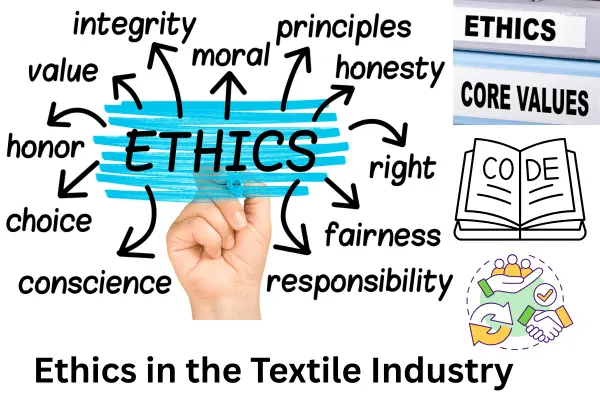With its fast-paced nature and high economic impact, the textile industry has become increasingly subject to ethical challenges regarding labor practices, transparency, and ethical sourcing. As consumers become increasingly aware of and demand ethical practices, the necessity for textile companies to adopt sustainable and ethical practices becomes ever more imperative. Here we present Ethics in the Textile Industry, the Challenges, and the Way Forward to a more sustainable and responsible future.

Labor Practices: Upholding Human Rights as Ethics in the Textile Industry
Labor practices are among the most urgent ethical concerns within the fashion industry.
In a report by Human Rights Watch Organization, it was outlined how most textile and apparel companies have been accused of bad work conditions, unequal pay, and human rights abuses. Practices like excessive overtime, poor safety, and even children’s employment have tarnished the industry’s reputation. Stopping such occurrences necessitates strict enforcement of labor standards and greater brand responsibility.
Efforts such as ordinary audits, Fair Trade certification, and independent inspections are becoming central to guaranteeing that labor rights are treated with respect and supported.
Brands increasingly see the strategic value of addressing labor ethics not as a voluntary corporate practice, but as a fundamental business strategy to succeed in the long term.
Tech and Transparency: The Path to Trust
Transparency is the foundation of ethical practices in any industry.
In the textile industry, this involves openly disclosing supply chain processes, sourcing patterns, and working conditions to consumers and stakeholders. However, complete transparency is still a challenge for most firms, partially due to intricate global supply chains.
Leading brands in transparency are leveraging technology such as blockchain and supply chain software like QUONDA and TrackIT, allowing customers to authenticate the origin and path of their products. This transparency creates consumer trust and allows companies to identify and solve potential ethical problems beforehand.
Responsible Sourcing: Sustainability and Accountability
Responsible sourcing entails the careful choice of raw materials and suppliers who practice ethical practices. The textile industry’s environmental impact, such as water usage, chemical dyes, and waste disposal, calls for sustainable sourcing. More and more companies are embracing green practices, such as organic cotton cultivation and the use of recycled materials.
Standards like the Global Organic Textile Standard (GOTS) and OEKO-TEX guarantee that products are manufactured with the least environmental footprint. Such practices conserve the environment and resonate strongly with ethically mindful consumers, fostering brand loyalty and competitiveness in the market.
Triple Tree Solutions: Digital Tools for Ethical Practices
Triple Tree Solutions provides digital tools tailored to help textile companies improve their ethical practices. Their software platforms offer transparency solutions, supply chain tracking, and compliance monitoring.
By leveraging digital technology, textile brands can gain clearer insights into their supply chain operations, ensure adherence to ethical labor standards, and manage responsible sourcing efficiently.
These tools support textile businesses in proactively identifying and addressing potential ethical issues, ultimately helping them build consumer trust and achieve sustainable business operations.
A Forward-Looking Approach
Meeting ethical issues in the apparel industry requires companies to persistently enhance labor, transparency, and sourcing practices. Active participation, openness, and compliance with global standards are essential for sustainable success.
As ethical consumerism increases, textile businesses have to synchronize their business strategies with ethical practices to avoid risks and innovate new market spaces.
Our guide elaborates much more on these aspects, along with practical considerations and in-depth analyses, for all who want to read more about ethical practices in the apparel and textile sector.
Discover in-depth insights on ethical practices in the apparel and textile sector here.
